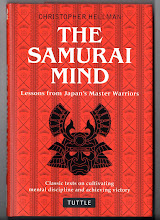
Time is a vital element in strategy.
I was reminded of this the other day when I was reading Fukuzawa Yukichi's autobiography - he mentions an unsuccessful attempt on his life during the tumultuous years of the bakumatsu period (1860s), when he had returned to his home domain to bring his mother to Edo where he was living. Xenophobic forces were strong, and as he worked as a translator for the government, he was seen as a suitable target for assassination by the young hotheads of the domain. Fortunately, his would be assassins spent so long arguing over who was to actually kill him, that he and his mother, both unaware of the danger, were gone by the time the attackers reached the inn where they had been staying. (Fukuzawa wryly notes that the precautions he took to preserve his life were never directly used, while he didn't realise he was in danger the times his life was really threatened).
A similar incident occurs in the Heike Monogatari, the account of the fall of the Taira clan in the 12th century. Prince Mochihito, supported by the monks of Miidera, just on the other side of the mountains to the east of Kyoto, are planning a night attack on the Taira mansion in the city. Of course, surprise is of the essence, but they take so long planning the thing that it's almost morning by the time they are ready to set off and the whole thing has to be called off.
It had a very familiar ring to it, which I think must have come from early exposure to Tolkien's use of the same idea in The Hobbit, when Gandalf gets the trolls fighting till daybreak and they are turned to stone.
But literature aside, the ability to make decisions and get things moving is a key factor in all kinds of strategic endeavors. A notable example in the military field is Alexander the Great, who was particularly good at this - much of his success was based on his ability to move faster, and more directly than his opponents, and not just when he was faced by the unwieldy Persian war machine. His early campaigns on the Danube are excellent examples of this.
More recently, the German blitzkrieg in WWII was predicated on constant forward motion - Rommel, for example, noted that his favoured form of reconnaissance was attack. Boyd's OODA loop also touches on this, and the more I go on, the more examples come to mind.
Perhaps the reason why it is so important is that people have a tendency to over-consider their choices before making a move - when we act, our move will change the situation so the choices we spent time considering may no longer exist. The ability to think or act on the fly gives a strong advantage to those who can do it, but ill-considered moves against a strong opponent can prove disastrous. Experience and real skill make all the difference.
But even in everyday life, the ability to move from one activity to another, to act 'immediately' after deciding, is a real boon (and not always my strong point, I admit). The ways in which this don't happen are numerous, and correct timing is also a vital consideration - sometimes you have to wait and pick your moment - but on the whole, it gives you an immense advantage to be able to do things fast.
Illustration: The Tale of Heike Illustrated Scroll, Edo period, Okayama Art Museum










No comments:
Post a Comment